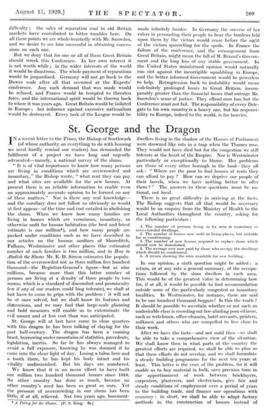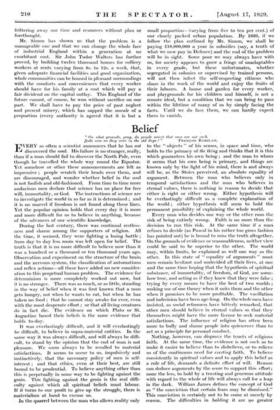St. George and .the Dragon
IN a recent letter to the Times, the Bishop of Southwark (of whose authority on everything to do with housing we need hardly remind our readers) has demanded the fulfilment of a project we have long and urgently advocated—namely, a national survey of the slums.
" It is of vital importance to know how many persons are living in conditions which are overcrowded and insanitary," the Bishop wrote, " what rent they can pay and what sites are available for the new houses. At present there is no reliable information to enable even an approximately accurate opinion to be formed on any of these matters." Nor is there any real knowledge— and the corollary does not follow so obviously as would at first appear—of the time and cost entailed in abolishing the slums. When we know how many families are living in houses which are verminous, insanitary, or otherwise unfit for human habitation (the best and latest estimate is one million*), and how many people are packed under conditions such as we have described in our articles on the human sardines of Shoreditch, Fulham, Westminster and other places (the estimated number of such families is two million, and in How to Abolish the Slums Mr. E. D. Simon estimates the popula- tion of the overcrowded not as three million five hundred thousand—the Registrar-General's figure—but as nine millions, because more than this latter number of persons are living at a density of three people to two rooms, which is a standard of discomfort and promiscuity few if any of our readers could long tolerate), we shall at last have to come to grips with the problem : it will not be at once solved, but we shall know its features and dimensions, and we may find that large-scale planning and bold measures will enable us to exterminate the evil sooner and at less cost than was anticipated.
St. George will at last have come to close quarters with this dragon he has been talking of slaying for the past half-century. The dragon has been a cunning beast, burrowing under mountains of statistics, precedents, legislation, inertia. So far he has always managed to avoid a full exposure, knowing he was doomed if he came into the clear light of day. Losing a talon here and a tooth there, he has kept his body intact and his vitality undiminished. But his days are numbered.
We know that it is no mean effort to have built one million two hundred thousand houses since 1918. No other country has done as much, because no other country's need has been as great as ours. Yet the pressure of overcrowding in our slums has been little, if at all, relieved. Not two years ago, basement- * Policy for the Slums. (P. S. King. 6s.) dwellers living in the shadow of the Houses of Parliament were drowned like rats in a trap when the Thames rose. They would not have died but for the congestion we still tolerate at the heart of the Empire. Nor is Westminster particularly or exceptionally to blame. Her problems are those of every other borough in the land—they all ask : " Where are the poor to find houses at rents they can afford to pay ? How can we deprive our people of their hovels, when we have nothing better to offer them ? " The answers to these questions must be na- tional, not local.
There is no great difficulty in arriving at the facts. The Bishop suggests that all that would be necessary would be an enquiry from the Ministry of Health to the Local Authorities throughout the country, asking for the following particulars :
1. The number of persons living in its area in insanitary or over-crowded dwellings.
2. The number of houses now unfit as living-places, but suitable for re-conditioning.
3. The number of new houses required to replace those which should now be demolished.
4. The average rent now paid by those who occupy the dwellings which should be condemned.
5. A return showing the sites available for new building.
In our opinion, a sixth question might be added : a return, or at any rate a general summary, of the occupa- tions followed by the slum dwellers in each area. This would be of the greatest value in determining how far, if at all, it would be possible to find accommodation outside some of the particularly congested or insanitary localities. In Westminster, for instance, there are said to be one hundred thousand beggars ! Is this the truth ? It should be possible to ascertain whether or not such an undesirable class is crowding out law-abiding poor citizens. such as watchmen, office-cleaners, hotel servants, printers, milkmen and others who are compelled to live close to their work.
After we have the facts—and not until then—we shall be able to take a comprehensive view of the situation. We shall know then in what parts of the country the greatest efforts are required, we shall be able to plan so that these efforts do not overlap, and we shall formulate a steady building programme for the next ten years at least. This latter is the crux of the problem, for it will enable us to buy material in bulk, save precious time in the apportionment of work between bricklayers, carpenters, plasterers, and electricians, give fair and steady conditions of employment over a period of years to the building trade, and finance our operations with economy : in short, we shall be able to adopt factory methods in the construction of houses instead of frittering away our time and resources without plan or forethought.
Mr. Simon has shown us that the problem. is a manageable one and that we can change the whole face of industrial England within a generation at no exorbitant cost. Sir John Tudor Walters has further proved, by building twelve thousand houses for colliery workers at rents varying from 8s. to 12s. a week, that, given adequate financial facilities and good organization, whole communities can be housed in pleasant surroundings with the comforts and conveniences that every worker should have for his family at a cost which will pay a fair dividend on the capital outlay. This England of the future cannot, of course, be won without sacrifice on our part. We shall have to pay the price of past neglect and present misery, which has sapped the morale of a proportion (every authority is agreed that it is but a small proportion—varying from five to ten per cent.) of our closely packed urban population. By 1939, if we follow the plan outlined by Mr. Simon, we shall be paying £18,000,000 a year in subsidies (say, a tenth of what we now pay in Defence) and the end of the problem will be in sight. Some poor we may always have with us,. for society appears to. grow a fringe of unadaptables in every grade, but these unfortunates, whether segregated in colonies or supervised by trained persons, will not then infect the self-respecting citizens who share in the work of the world and enjoy the fruits of their .labours. A house and garden for every worker, and playgrounds for his children and himself, is not a remote ideal, but a condition that we can bring to pass within the lifetime of many of us by simply facing the facts. Until we do face them, we can hardly expect them to vanish.

































 Previous page
Previous page